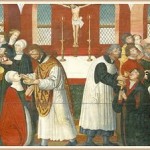Among the varied groups that arose from the Protestant reformation, there are different practices regarding the utilization of the church calender, and subsequently, of the observance of the season of Lent. The Anglican and Lutheran traditions retained the traditional church calender with some modifications, and Reformed and Anabaptist groups rejected the observance of Lent. Every year, just before Ash Wednesday, a series of blog posts from different authors crop up against the observance of Lent, usually from a Reformed perspective. I want to offer the opposite view, and I present five reasons why the observance of Lent is beneficial:
1. God commands us to fast. In the Old Testament, a specific fast was commanded for the nation of Israel (on the Day of Atonement), and others were practiced voluntarily. It was a means by which God taught his people that they needed to rely on his spiritual nourishment, rather than simply earthly food. The New Testament contains, similarly, several references to fasting. The early church fasted (Acts 13:1-3), Paul fasted (2 Cor. 6:5), and Jesus fasted (Luke 4:1-2). Choosing to observe Lent is to have an opportunity to utilize a spiritual discipline that God honors.
2. The life of the Christian is one of repentance. The primary theme of the season of Lent is repentance. By observing the season of Lent, Christians are taking time to do that which every person is called to: repent. Jesus summarized the essence of his message as “repentance and the forgiveness of sins” (Luke 24:47). In observing Lent, the church is called back to its primary mission, and Christians are driven to examine themselves, seeking forgiveness in Christ. How could there be anything wrong with a season of the year which focuses on a central teaching Jesus?
3. Christian piety is not an individualistic enterprise. We are not, as Christians, called to be pious on our own. We are called to live our Christian lives in the midst of the Christian community. Lent is a way in which we do that. Those who reject the practice of Lent are OK with individual persons deciding that they are going to fast for a time, or for an individual pastor to decide that he is going to preach a series of sermons on repentance. However, when the church catholic observes a fast, somehow it becomes wrong. In the New Testament, however, fasting is usually a corporate, rather than an individualistic practice (Acts 13:1-3, Acts 14:21-23). By observing Lent, we are joining ourselves to our brothers and sisters in Christ, fasting not on our own, but with the support and strength of the church catholic.
4. The observance of Lent is historic. Many events on the church calender trace their origin back to the early church. Lent is one such aspect of the church calender that is ancient. The observance of a time of preparation prior to the celebration of Easter goes back at least to the second century. St. Irenaeus mentions a short Lenten period, which did not likely last for a full forty days. By the middle of the fourth century, Lent was being regularly observed throughout the Christian world in a period of 40 days in connection with the forty days that Jesus spent in the wilderness. The entire Church celebrated this season throughout its history until some Protestant groups rejected it in the sixteenth century. To observe Lent is to connect oneself, not only to the universal church on earth, but to the historic church. To reject Lent is to reject the piety of Christians for almost 2,000 years.
5. The church calender helps us to be balanced. One of the greatest benefits of the church calender is that is causes the church to teach on every important event and teaching in the life of Jesus each year. In doing so, the church does not teach certain aspects of the Christian faith to the neglect of others. The Lenten season assures that every liturgical church will spend time focusing on the important theme of repentance during the year, just as the celebration of Easter means that every church teaches on the resurrection, and Pentecost assures that every congregation has time to emphasize the work of the Holy Spirit.












